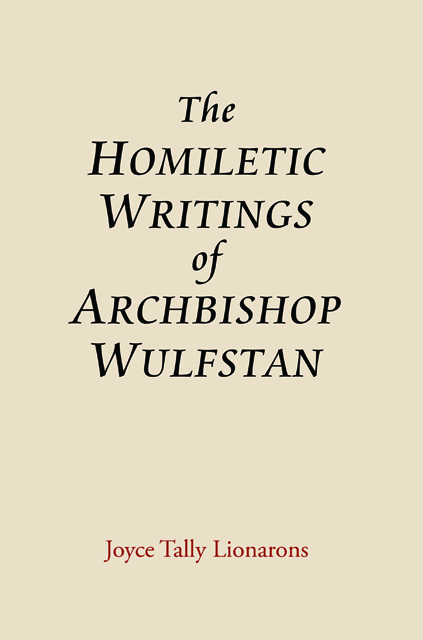Book contents
- Frontmatter
- Contents
- Acknowledgements
- Abbreviations
- Manuscript Sigla
- Introduction
- 1 Wulfstan and Wulfstan Manuscripts
- 2 Re-establishing the Wulfstanian Homiletic Canon
- 3 Wulfstan’s Eschatology
- 4 Salvation History and Christianity
- 5 Wulfstan as Archbishop
- 6 Sacramental Sermons
- 7 The Danish Invasions and the Sermo Lupi ad Anglos
- 8 Homilies Based on Legal Codes and the Institutes of Polity
- Bibliography
- Index
- Miscellaneous Endmatter
4 - Salvation History and Christianity
Published online by Cambridge University Press: 18 February 2023
- Frontmatter
- Contents
- Acknowledgements
- Abbreviations
- Manuscript Sigla
- Introduction
- 1 Wulfstan and Wulfstan Manuscripts
- 2 Re-establishing the Wulfstanian Homiletic Canon
- 3 Wulfstan’s Eschatology
- 4 Salvation History and Christianity
- 5 Wulfstan as Archbishop
- 6 Sacramental Sermons
- 7 The Danish Invasions and the Sermo Lupi ad Anglos
- 8 Homilies Based on Legal Codes and the Institutes of Polity
- Bibliography
- Index
- Miscellaneous Endmatter
Summary
WHEN WULFSTAN became bishop of London in 996 and later archbishop of York and Worcester in 1002, he took on the powers and responsibilities that the church had assigned to bishops since late antiquity: the potestas ordinis, the power to administer the sacraments reserved for bishops and archbishops – confirmation and the ordination of priests – as well as the power to consecrate new bishops and to dedicate churches, altars, and chrism; the potestas jurisdictionis, the power to legislate for and dispense justice to those within his sees; and the potestas magisterii, the power to instruct both the clergy and laity. The second of these may have provided the most practical venue for societal reform; however, the third would likely have seemed the most immediately important, especially in the large and remote archdiocese of York, which was arguably the poorest and least educated part of the country. The north had barely been touched by the tenth-century monastic reform movement, and despite its geographical magnitude, at the time of Wulfstan's accession the province could boast only two large ecclesiastical centers, at York and Durham. In addition, the area had a sizeable Anglo-Scandinavian population made up of the descendants of late-ninth- and early-tenth-century settlers, who by Wulfstan's time had been converted to Christianity, but who were not, perhaps, as thoroughly instructed in the faith as the archbishop would have wished them to be, and who may have engaged in a syncretic mix of Christian and pagan practices. There would also have been relatively recent immigrants among them, primarily Danish merchants, some of whom may have continued to practice the religion of their ancestors, even though Denmark had been officially Christian for a good generation. As archbishop, Wulfstan would have been concerned to mold this constituency into a single Christian community united not only by a common faith, but also by common ritual practices and moral behavior.
During his final years as bishop of London and the first decade of his tenure as archbishop of York, Wulfstan wrote a series of homilies designed to teach the rudiments of the Christian religion to the two principal segments of the population within his sees: the Catholic laity, both English and Danish, and the secular priests, some of whom might themselves have needed basic theological instruction in English, but all of whom could appropriate Wulfstan's vernacular sermons for their own use.
- Type
- Chapter
- Information
- The Homiletic Writings of Archbishop WulfstanA Critical Study, pp. 75 - 107Publisher: Boydell & BrewerPrint publication year: 2010



